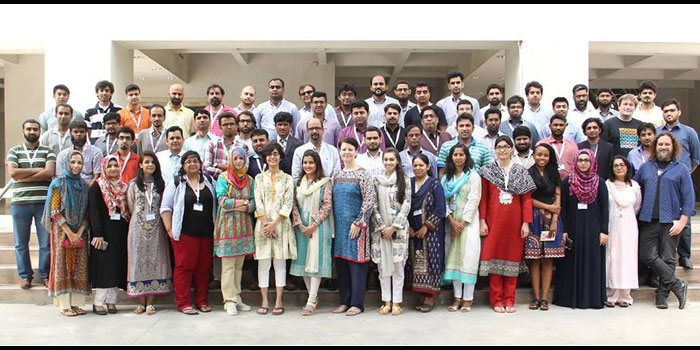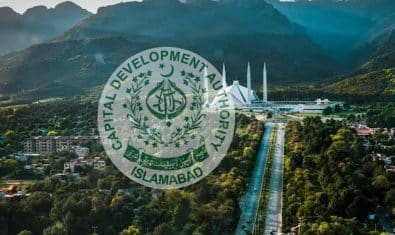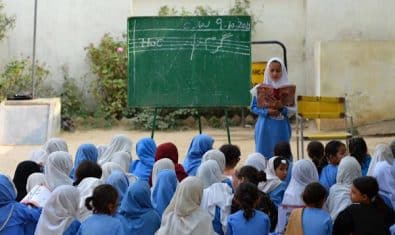Pakistan’s first ever data bootcamp, which was offered by the Center for Excellence in Journalism at IBA in collaboration with Hacks/Hackers Pakistan and Code for Africa, concluded over the weekend.
The event brought together over 60 journalists, civic activists and developers from all over Pakistan for 3 days of intense trainings, networking and collaborating to learn more about and build projects in the data journalism sphere. Trainers from all over the world conducted various sessions on data journalism, data scraping and data visualization among others. They included:
- Justin Arenstein, a Mozambique based award winning investigative journalist and digital strategist currently working with Google and the AMI to strengthen Africa’s watchdog media by working with newsrooms to implement better forensic research and evidence based reportage.
- Friedrich Lindenberg, a Berlin based coder and data journalist who is currently working as a news technologist with Code for Africa.
- Serah Rono, who is based in Kenya and is Code for Africa’s developer advocate. She is also serving as the community coordinator and working with its technical pan-African projects and programmes.
- Fahad Sultan, a researcher working at the Technology for People Initiative (TPI) at LUMS and the lead for Statistaan, a data project.
- Humza Humayun, who is also a researcher working at TPI LUMS. He has previously worked with the Punjab Police to help them set up their GIS analysis systems.
- Rahma Mian, a Knight International Journalism Fellow in Pakistan where she works to set up data driven media projects and creates partnerships between technology, journalism and open government communities. She is the co-organizer of Hacks/Hackers Pakistan.
- Shaheryar Popalzai, a journalist associated with the Jang and Geo media groups in Pakistan. He is also a co-organizer of Hacks/Hackers Pakistan.
On the third day, CEJ-IBA held a discussion on ‘Challenges and Possibilities of Working with Data’. The panel was moderated by Khurram Husain, Assistant Editor at Dawn. The panelists included:
- Asif Saeed Memon, Associate Fellow at Sustainable Development Policy Institute (SDPI)
- Saman Naz, Data and Evidence Campaign Manager, Alif Ailaan
- Burhan Rasool, Director, Software Engineering, Punjab Information Technology Board (PITB), Govt of Punjab
- Fahim Zaman, Dawn GIS and former Administrator Karachi
The key takeaway from the panel discussion was that there is enough data in Pakistan. Saying there isn’t is lazy and incorrect. However, since data collection is an arduous and expensive process, it’s fiercely guarded by the respective government departments and private entities. Until a culture of sharing is inculcated, activists and journalists should pool their resources together and use various tools at their disposal (like the Right to Information Law, which we will be covering in detail later on).
At the end of the event, 5 projects were collectively awarded more than $10,000 in support to flesh out their ideas for maximum impact. The finalists will also be supported by an AfterCare program which will connect them with a network of mentors, developers and strategists to ensure their ideas reaches critical mass. The winning projects included:
- Inside Honor Crimes: A data visualization portal that details all the crimes committed against women in the name of honor.
- Kitnay Ka: A SMS based tool to determine whether or not your shopkeeper is charging you more than the government declared price for a specific item.
- Mustaqbil: A more methodical way to select where you should work and why, it mines jobs data to create employment trends and analysis.
- Crime Alert: Which areas are experiencing a crime wave? A heat map that visualizes criminal activities and shows unsafe areas.
- Where are the Minorities, a project that aims to engage a desensitized audience by analyzing and presenting data on asylum seekers and refugees of Pakistani origin as well as incidents of attacks on minorities.
With our world becoming more data rich by the second, journalists and developers need to collaborate more often than ever to extract stories that matter. An open government means nothing if there is no one to parse the data it provides and then relay it to the public in an engaging manner.
This is where events like the dBootcamp Karachi come in. They ensure that there is at least a modicum of understanding between developers and journalists and lead to practical ideas and advice that can be taken back to the newsroom to benefit the public.
ProPakistani will be covering the nascent field of data journalism and how you can make an impact in future posts


























10K USD.. they must be joking. you cant even buy a good server in 2K for 1 year.
Cheap as chips price for valuable Data.
Express Tribune Team’s ( Where are the minorities. ) Project Won 3rd prize . Prototype available at http://www.IrfanAnsari.com/dbootcamp
https://twitter.com/ZahidGishkori/status/597155441974448128